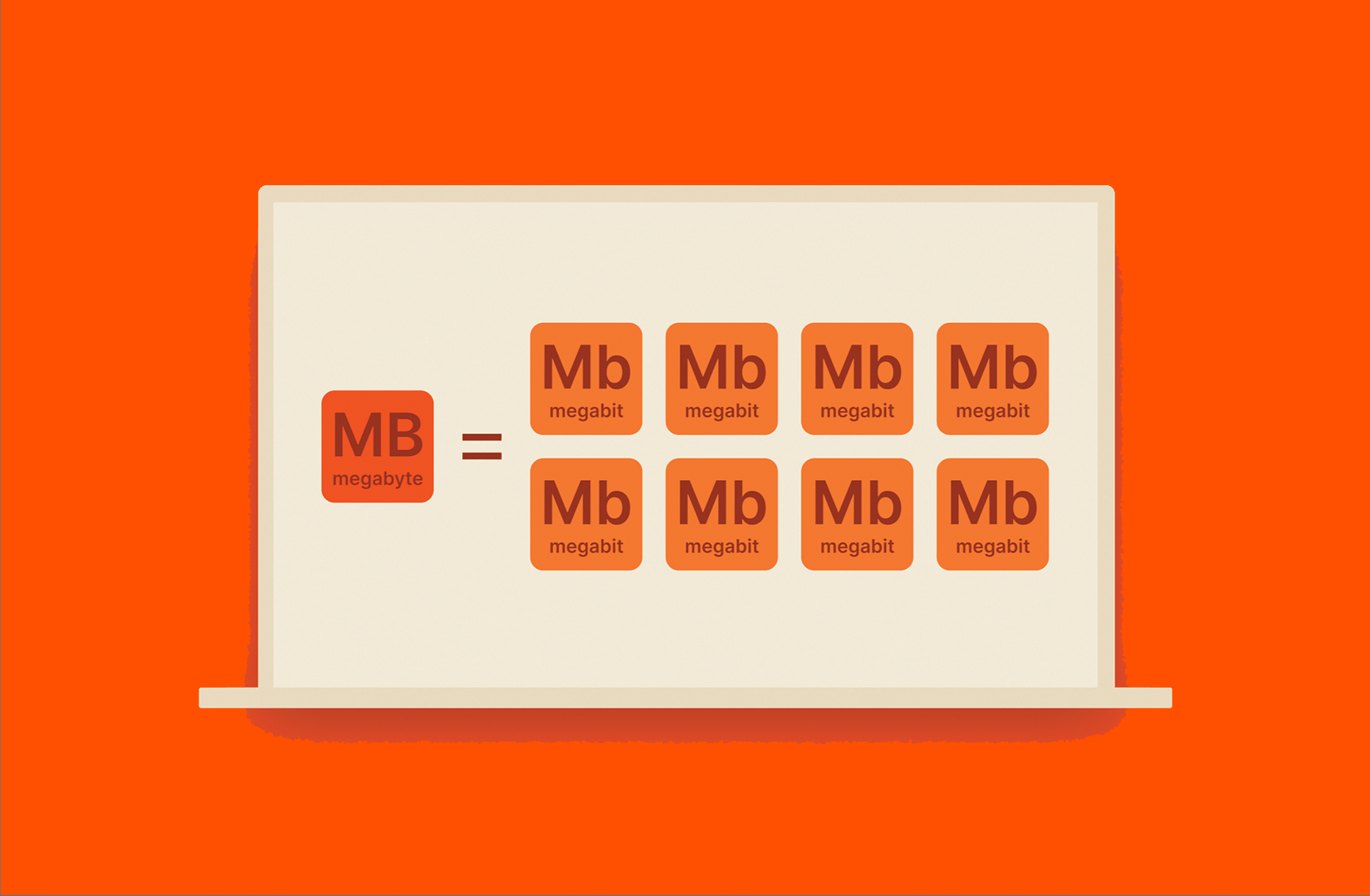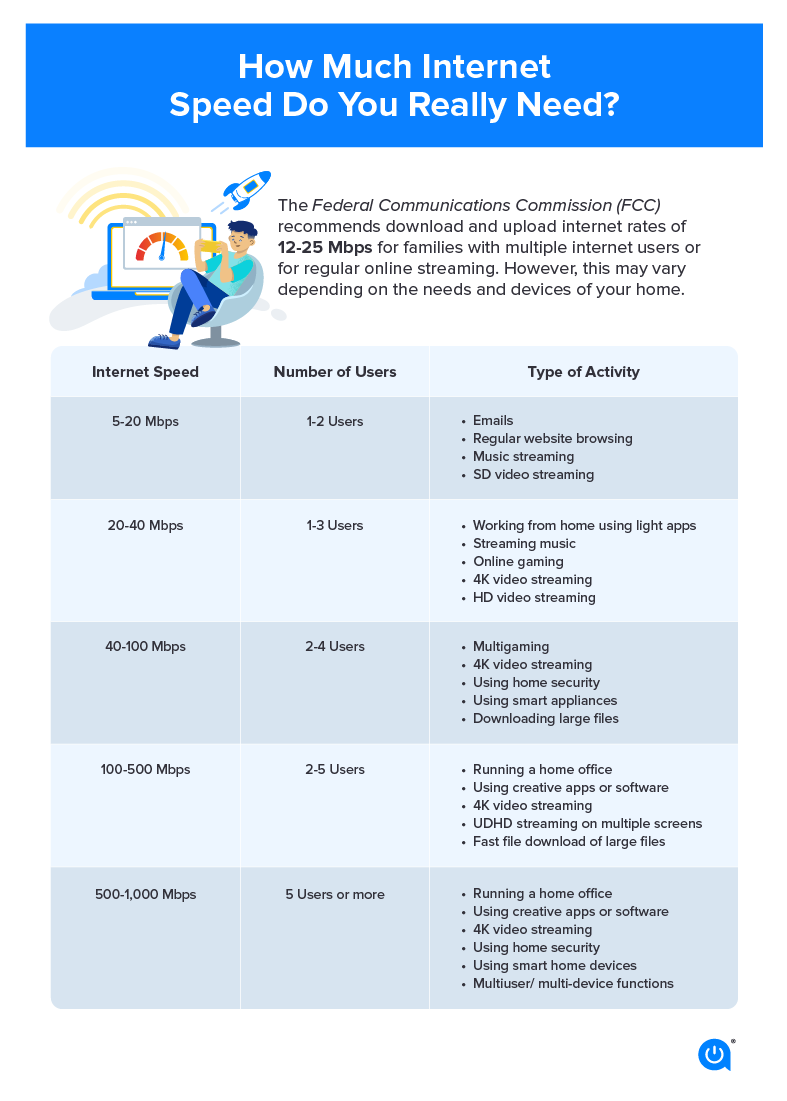Understanding Exactly How Megabits Per Second Affect Your Internet Experience
Understanding Exactly How Megabits Per Second Affect Your Internet Experience
Blog Article
Exactly How Megabits Per Second Impact Your Online Tasks
The concept of megabits per second (Mbps) plays an essential function fit our on-line experiences. As electronic activities multiply, understanding the implications of Mbps on video gaming, streaming, and video clip conferencing becomes increasingly essential. Greater Mbps can improve performance and reduce disruptions, while inadequate speeds might cultivate frustration and ineffectiveness. Evaluating your household's certain requirements in relationship to these rates is essential, particularly as several devices try data transfer. Yet, the nuances of just how Mbps influences various online tasks warrant more exploration, especially as our reliance on digital connectivity proceeds to evolve.
Understanding Megabits Per Second
When taking into consideration web speed, it's important to comprehend the principle of megabits per second (Mbps), which acts as a standard measurement for information transfer prices. This statistics measures just how much data can be transferred over an internet connection in one second, giving a clear understanding of performance capacities - Megabits Per Second. For context, one megabit amounts to one million bits, and Mbps is commonly utilized to reveal transmission capacity for numerous online tasks
A greater Mbps suggests a quicker internet link, allowing individuals to do tasks such as downloading data, browsing internet sites, and participating in on the internet pc gaming a lot more effectively. Common browsing requires around 1-5 Mbps, while streaming high-def video clip might require 5-25 Mbps. Understanding these demands is essential for establishing the proper internet rate needed for details tasks.
Additionally, the number of gadgets linked to a network can impact total efficiency. Multiple individuals streaming, pc gaming, or downloading simultaneously can strain available transmission capacity, leading to slower speeds - Megabits Per Second. Evaluating personal online behaviors and needs is crucial in picking a net strategy that aligns with one's needs, guaranteeing a smooth electronic experience
Streaming and Buffering Issues
Streaming high-def web content has actually become a staple of modern-day online enjoyment, yet it is often come with by frustrating buffering issues. These interruptions can significantly interfere with the seeing experience, bring about dissatisfaction and potential loss of audience involvement. Buffering occurs when the information sent from the streaming service is not gotten swiftly sufficient to maintain a smooth playback, often as a result of insufficient internet speed determined in megabits per second (Mbps)

Furthermore, real-time streaming can be affected by network blockage, which happens when numerous devices share the same transmission capacity. Optimizing link rate and making sure sufficient Mbps is necessary for a seamless streaming experience. As streaming solutions proceed to develop, recognizing the influence of Mbps on buffering problems continues to be important for customers looking for continuous visit here home entertainment.
Online Video Gaming Efficiency
The effect of web speed on online activities extends past streaming, dramatically influencing on-line gaming efficiency. In affordable video gaming, reduced latency and high bandwidth are vital for a seamless experience. A quick link decreases lag, allowing gamers to respond swiftly to in-game events, which can be the difference between triumph and defeat.
Data transfer, determined in megabits per second (Mbps), plays an important role in sustaining multiple devices and video gaming systems all at once. Insufficient bandwidth can bring about went down links or decreased video game top quality, negatively affecting gameplay. For circumstances, on-line multiplayer games call for substantial information transfer, particularly throughout peak gaming hours when countless players are online.
Furthermore, the kind of game can additionally dictate the required web speed. Busy first-person shooters require greater rates to maintain responsiveness, while turn-based technique video games may function moderately well on lower speeds. As online pc gaming remains to develop, with boosting visual fidelity and even more intricate multiplayer atmospheres, the demand for higher Mbps will just magnify. Gamers need to ensure they have sufficient web speed to enhance their gaming efficiency and general experience. Buying a robust web connection is vital for players aiming to maximize their performance and pleasure.
Video Clip Conferencing Quality
In today's electronic landscape, video conferencing quality is heavily influenced by web rate, especially in terms of bandwidth and latency. Premium video calls call for sufficient useful content transmission capacity to transmit audio and video information effortlessly. Commonly, a minimum of 1.5 Mbps upload and download speeds is advised for basic interpretation video, while high-def video conferencing normally demands at the very least 3 Mbps.
Latency, or the hold-up in between sending and getting information, likewise plays an important role in the individual experience. Low latency ensures that discussions flow naturally without unpleasant stops briefly or interruptions. Preferably, latency must be below 150 nanoseconds for effective communication. Higher latency can cause echo, lag, and disjointed interactions, which can impede collaboration and engagement during conferences.
In addition, numerous participants in a video clip meeting can strain available bandwidth, requiring even greater speeds. Network congestion, typically triggered by synchronised activities like streaming or downloading, can additionally deteriorate video top quality. Thus, for companies depending on video conferencing for remote collaboration, recognizing the relationship between megabits per second and general interaction high quality is necessary for preserving productivity and boosting online communications.
Selecting the Right Web Plan
Selecting an ideal internet plan is important for making sure optimum performance in various online activities, particularly in settings that require high bandwidth, such as video clip conferencing and online gaming. Megabits Per Second. When taking into consideration a net strategy, it is important to evaluate both the rate and information allocation to match your certain usage needs
For homes with several users involving in synchronised activities, a strategy supplying higher megabits per second (Mbps) is advised. Usually, a minimum of 25 Mbps appropriates for conventional streaming and surfing, while strategies going beyond 100 Mbps are better for more intensive tasks. In addition, take into consideration the nature of your online activities; video conferencing requires at the very least 1.5 Mbps submit rate, while online gaming may require a reduced latency however consistent link.
Unrestricted data plans can stop throttling and disruptions, particularly if hefty usage is expected. By thoughtfully selecting a net strategy tailored to your demands, you can improve your on-line experience, making sure smooth, undisturbed accessibility to your recommended activities.
Final Thought
In conclusion, the relevance of megabits per second article source (Mbps) in forming on-line tasks can not be overstated. A detailed understanding of individual or family Mbps requirements is crucial for picking a suitable internet plan that appropriately sustains varied online activities and individual needs.

Normally, a minimum of 25 Mbps is appropriate for standard streaming and browsing, while plans surpassing 100 Mbps are more suitable for even more intensive tasks. In addition, think about the nature of your online activities; video conferencing requires at least 1.5 Mbps submit rate, while online pc gaming may need a lower latency yet constant connection.
Report this page